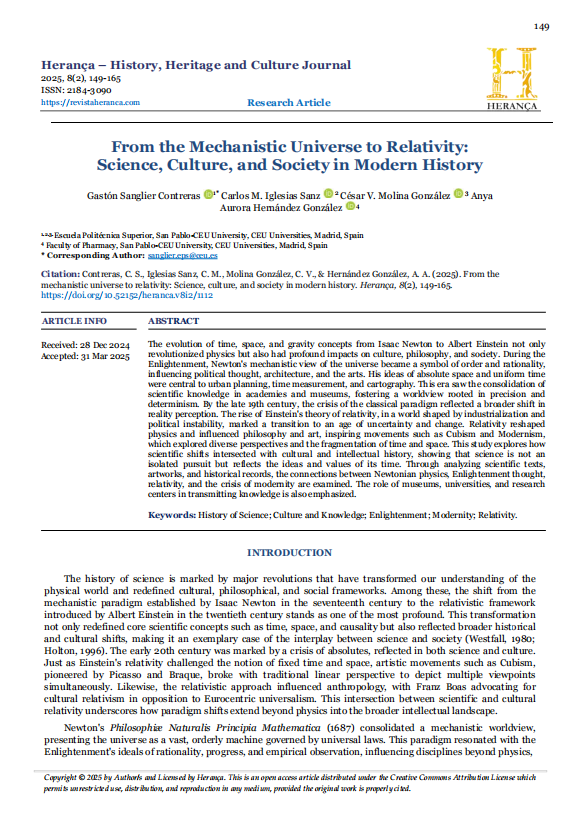From the Mechanistic Universe to Relativity: Science, Culture, and Society in Modern History
DOI:
https://doi.org/10.52152/heranca.v8i2.1112Keywords:
History of Science, Culture and Knowledge, Enlightenment, Modernity, RelativityAbstract
The evolution of time, space, and gravity concepts from Isaac Newton to Albert Einstein not only revolutionized physics but also had profound impacts on culture, philosophy, and society. During the Enlightenment, Newton's mechanistic view of the universe became a symbol of order and rationality, influencing political thought, architecture, and the arts. His ideas of absolute space and uniform time were central to urban planning, time measurement, and cartography. This era saw the consolidation of scientific knowledge in academies and museums, fostering a worldview rooted in precision and determinism. By the late 19th century, the crisis of the classical paradigm reflected a broader shift in reality perception. The rise of Einstein's theory of relativity, in a world shaped by industrialization and political instability, marked a transition to an age of uncertainty and change. Relativity reshaped physics and influenced philosophy and art, inspiring movements such as Cubism and Modernism, which explored diverse perspectives and the fragmentation of time and space. This study explores how scientific shifts intersected with cultural and intellectual history, showing that science is not an isolated pursuit but reflects the ideas and values of its time. Through analyzing scientific texts, artworks, and historical records, the connections between Newtonian physics, Enlightenment thought, relativity, and the crisis of modernity are examined. The role of museums, universities, and research centers in transmitting knowledge is also emphasized.
Downloads
References
Bergson, H. (1922). Durée et simultanéité: à propos de la théorie d'Einstein. Paris, France: Félix Alcan.
Cassirer, E. (1923). Substanzbegriff und Funktionsbegriff. Berlin, Germany: Bruno Cassirer.
Clark, T. J. (1973). The absolute bourgeois: Artists and politics in France 1848–1851. Princeton, NJ: Princeton University Press.
Comte, A. (1844). Cours de Philosophie Positive. Paris, France: Bachelier.
Eddington, A. S. (1920). Space, time and gravitation: An outline of the general relativity theory. Cambridge, UK: Cambridge University Press.
Einstein, A. (1905). Zur Elektrodynamik bewegter Körper [On the electrodynamics of moving bodies]. Annalen der Physik, 322(10), 891-921.
Einstein, A. (1915). Die Feldgleichungen der Gravitation [The field equations of gravitation]. Sitzungsberichte der Königlich Preußischen Akademie der Wissenschaften, 844-847.
Galison, P. (2003). Einstein's clocks and Poincaré's maps: Empires of time. London, UK: W.W. Norton & Company.
Gay, P. (1977). The enlightenment: An interpretation. London, UK: W.W. Norton & Company.
Heilbron, J. L. (2003). The sun in the church: Cathedrals as solar observatories. Cambridge, MA: Harvard University Press.
Holton, G. (1996). Einstein, history, and other passions: The rebellion against science at the end of the Nineteenth Century. Cambridge, MA: Harvard University Press.
Kepler, J. (1609). Astronomia Nova. Heidelberg, Germany: G. Voegelin.
Locke, J. (1689). Two treatises of government. London, UK: Awnsham Churchill.
Mann, T. (1924). Der Zauberberg. Berlin, Germany: S. Fischer Verlag.
Maxwell, J. C. (1873). A treatise on electricity and magnetism. Oxford, UK: Clarendon Press.
Michelson, A. A., & Morley, E. W. (1887). On the relative motion of the earth and the luminiferous ether. American Journal of Science, 34(203), 333-345.
Newton, I. (1687). Philosophiæ Naturalis Principia Mathematica. London, UK: Royal Society.
Porter, R. (2000). Enlightenment: Britain and the creation of the modern world. London, UK: Penguin.
Shapin, S. (1996). The scientific revolution. Chicago, IL: University of Chicago Press.
Smith, A. (1776). An inquiry into the nature and causes of the wealth of nations. London, UK: W. Strahan and T. Cadell.
Westfall, R. S. (1980). Never at rest: A biography of Isaac Newton. Cambridge, UK: Cambridge University Press.

Downloads
Published
How to Cite
Issue
Section
License
Copyright (c) 2025 Herança

This work is licensed under a Creative Commons Attribution 4.0 International License.






8.png)





